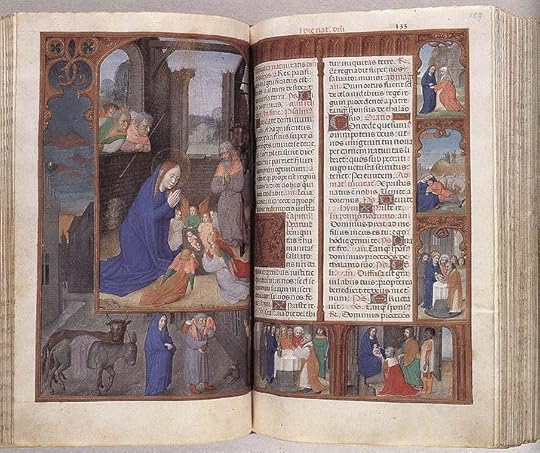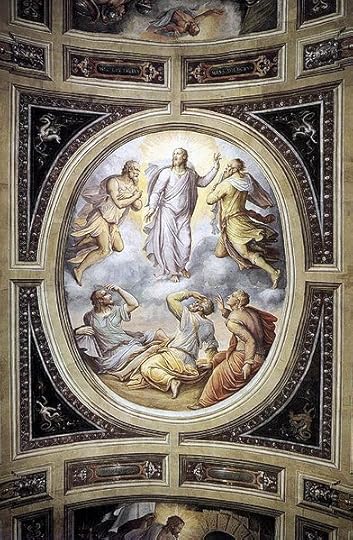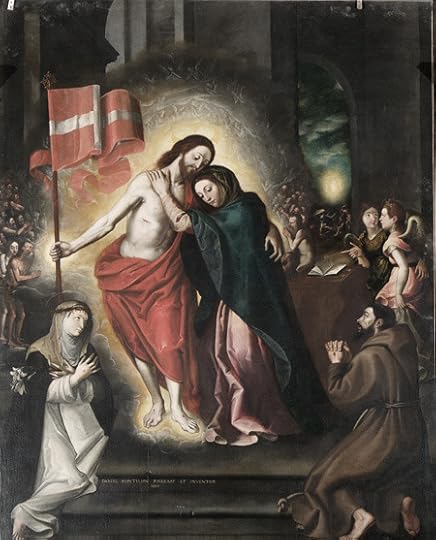Connie Rossini's Blog, page 16
April 8, 2014
What’s the Little Way got to do with detachment?

Monument to St. John of the Cross in Frontiveros, Spain.
You can’t read the Carmelite saints for long without encountering the idea of detachment. We find it in the writings of John of the Cross, of Teresa of Avila, and even of St. Therese. Detachment for Catholics is not the same as mere penance. Detachment, like the entire spiritual life, begins and ends with love.
St. John of the Cross is the master teacher about detachment. Here is his famous passage on detachment from The Ascent of Mount Carmel:
Endeavor to be inclined always:
not to the easiest, but to the most difficult;
not to the most delightful, but to the most distasteful;
not to the most gratifying, but to the least pleasant;
not to what means rest for you, but to hard work;
not to the consoling, but to the unconsoling;
not to the most, but to the least;
not to the highest and most precious, but to the lowest and most despised;
not to wanting something, but to wanting nothing.
Do I detect a few sighs?
If we read this passage out of context, the spiritual life appears dry, difficult, and even impossible. We are tempted to give up before we even begin. We reject John of the Cross and move on to another saint whose teaching appears less demanding.
What if I told you that St. Therese practiced perfect detachment? What if I told you her Little Way makes the same demands as John’s Ascent? Let’s look at the passage again in light of the life and teaching of St. Therese.
Detachment is a matter of the willThe first line holds the key to understanding this passage: Endeavor to be inclined. We must try to choose dryness when we have a chance. But we cannot always do so. When we experience natural pleasure, we don’t frown upon it. When someone praises us or gives us gifts, we don’t say, “No, thanks.” When God gives us consolations, we don’t get frustrated. We cannot control all our experiences or even our initial feelings about them. But we can control how much we love them.
St. Therese wrote:
The attraction to penance was given me, but I was permitted nothing to satisfy it. The only mortifications I was allowed consisted in mortifying self-love, which did me more good than corporal penance.”
Ask yourself: What does God want me to give up? What does He want me to accept or endure out of love for Him or others? Do I love my chosen penances or spiritual practices more than I love God’s will?
We choose the less appealing option out of love for God“With jealous care all must be kept for Jesus; it is so good to work for Him, and for Him alone!” Therese wrote.
When the novices under her direction came and interrupted her prayer time with their questions, she was at first disturbed. Wasn’t her time with Jesus more important than giving advice to others? Then she realized that Jesus Himself, when He sought solitude in the desert, was followed by people who had heard Him speak or seen Him do miracles. Should we desire to be left alone, when Jesus so seldom had time to Himself? No, she decided, we should desire to be just like Him.
She said:
When we really love, we rejoice in the happiness of the loved one and make every sacrifice to procure it for him.
Ask yourself: Am I looking at detachment as just a difficult demand of the spiritual life? Can I learn to see detachment instead as a commitment to love God to the point of giving up everything that hinders union with Him?
Detachment makes suffering sweet“I thank my God for making me walk in darkness,” said Therese; “in it I am wrapped in profound peace.”
Before she entered Carmel, Therese would wake up in the morning and, realizing that many difficulties lay in the hours ahead, be dismayed. Later she wrote:
Now it is quite the other way: I think of the difficulties and the sufferings that await me, and I rise more joyous and more full of courage the more I foresee opportunities of proving my love for Jesus…
At the end of her life, she said that she was no longer able to suffer, “because all suffering is sweet to me.”
Ask yourself: Do I believe that the Holy Spirit will change my hopes and desires as I grow closer to Christ? Can I give up earthly pleasures in exchange for abiding peace?
St. Therese’s Little Way is not burdensome. It is not too difficult for ordinary Christians. Yet it is a way of complete detachment from everything but God. It is perfectly Carmelite in its spirituality. If you love Therese and her Little Way, are you willing to give detachment a try?
Connie Rossini
The passage from the Ascent of Mt. Carmel is from The Collected Works of St. John of the Cross, Translated by Kieran Kavanaugh and Otilio Rodriguez.
All quotes from St. Therese but the last one are from Thoughts of Saint Therese, translated by an Irish Carmelite and published by Tan Books.
Other posts you may likeContemplative Homeschool.April 4, 2014
Spiritual reading (and writing) can help keep you on track

Folios from the Mayer van den Bergh Breviary (Wikimedia Commons).
I like to say that almost everything I know came from a book. That’s true even in the spiritual life. Spiritual reading gives me the knowledge I need to do God’s will.
Of course, after I read advice from the Bible, the lives of the saints, or other spiritual works, I have to ingest it. I learn by experience how it applies to me. But I’d be more or less ignorant of the spiritual life if I never read about it.
Writing about spiritual matters also keeps me focused on truth. Having thought about trust so much over the past fifteen months, especially while writing blog posts and my upcoming book, I find it easy to think about God throughout the day.
That doesn’t mean it’s always easy to do His will. I’ve been struggling in various ways this week. Ironically, my own written words help me let go of my fears and frustrations and trust in God.
Here are some of my favorite spiritual books from past posts:
Contemplative Homeschool.April 1, 2014
Family and homeschool activities for the rest of Lent

The Taking of Christ by Caravaggio. Study the artists’ paintings of the Passion as part of your Lenten activities.
Ready to celebrate the rest of Lent as a family? Here are several activities you can do together, whether or not you homeschool.
p=suitable for grades 1-3
m=suitable for grades 4-6
j=suitable for grades 7-9
s=suitable for grades 10-12
Besides reading the Gospel accounts of Holy Week, try reading and discussing the following books that deal with sacrifice, martyrdom, or resurrection:
The Velveteen Rabbit by Margery Williams (p).
The Tale of Three Trees by Angela Elwell Hunt (p+).
The Queen and the Cross: The Story of St. Helen by Cornelia Mary Bilinsky (p, m)
The Lion, the Witch, and the Wardrobe by C. S. Lewis (p+ for reading aloud; m+ for independent reading).
MoviesWe always watch Jesus of Nazareth this time of year. Here are some other movie choices you may not have thought of. All can provide interesting fodder for comparisons and contrasts with the events of Holy Week:
Disney’s Sleeping Beuaty (p+).
The Prince of Egypt (p+).
Joseph: King of Dreams (p+; see Typology section for more on Joseph).
Ben Hur –animated version by CCC (p+).
Alfred Hitchcock’s I Confess (m+; some adult situations, tastefully done, that will go over youngsters’ heads).
A Man for All Seasons (m+; about half a dozen instances of profanity, implied adultery, and divorce).
E.T. the Extra-Terrestrial (j+).
Typology and ProphecyRead my post on Contemplative Homeschool.
March 28, 2014
Update on writing and video projects

Photo by Berthold Werner, Wikimedia Commons.
You may be wondering whatever happened to the videos I was hoping to produce this year. Here’s a quick update on that project, as well as a status report on my book.
My husband Dan also has a video project in mind. He wants to create professional quality videos from the start. That means acquiring a dedicated computer for video production and storage. Dan worked with computers before going off to study philosophy in graduate school (guess which one pays better?). He decided to build a computer for himself to get exactly what he wanted. That part of the project is now finished.
The next step is building a new computer for me, since mine is getting outdated. A weekend should suffice for that. Then we’ll need to rearrange our office and set up our studio. After that, I hope to work on my first project, a video version of Trusting God with St. Therese" />Contemplative Homeschool.
March 25, 2014
The Transfiguration teaches us detachment

The Transfiguration by Gherardi (Wikimedia Commons). What must you let go of to grow closer to Christ?
Last week’s Gospel was about the Transfiguration of Jesus. As you recall, Jesus took Peter, James, and John up Mt. Tabor. Moses and Elijah appeared and spoke with Him about His coming Passion. Hearing the Gospel, I was struck by what it teaches us about detachment in the spiritual life.
Moses represents the Law. Elijah represents the Prophets. The Law and the Prophets together form the basis of the Old Testament.
From the good to the perfectWhen Peter saw Moses and Elijah, he said, “Lord, it is good for us to be here.” He suggested building booths or tents in which the three religious figures could stay. No doubt he wanted to speak with Moses and Elijah and hear their wisdom in person.
But this was not God’s plan. God the Father spoke to the Apostles from the cloud. Then they looked up and saw Jesus standing before them alone.
The Law and the Prophets prepared the way for Jesus. But now that Jesus had come, they had to give way. They were good, but the Gospel is better. Moses and Elijah served their purpose in pointing towards Jesus. As St. Paul said, “When the perfect comes, the imperfect passes away” (1 Corinthians 13:10).
Letting go of the merely good in our livesLike the Apostles, we need to leave behind all that is “merely good’ in order to be perfectly conformed to Christ. We cannot cling to anything or anyone but Him.
Children–and beginners in the spiritual life–have different needs than adults. Infants need milk. Adults need solid food. God weans us from the practices that nourished us in the beginning so that we can be spiritually mature.
Moving beyond the LawAs we grow, we need to let go of these things that metaphorically relate to the Law:
counting our meritscomparing ourselves with othersknowledgemeditation on Sacred ScriptureNow, obviously, we cannot give up knowledge in the sense of becoming ignorant again. We can’t start ignoring Church teaching. But we can come to recognize that God is immeasurably greater than all human knowledge. We can stop nitpicking, stop judging. We can move from a spirituality based on knowledge to one based on love.
And so with the other items in the list. We give up meditation for contemplation. We give up comparisons that in the beginning may have inspired us toward holiness, but now foster pride. We stop weighing our sins against our merits, realizing that the scale will never be balanced.
Moving beyond the ProphetsWe need to let go of these things that metaphorically recall the Prophets:
visions, dreams, and prophesiesmiraculous signsspiritual consolationsecstasies and rapturesAs good as these things are in the proper place and time, they are not the goal. There are merely means to the end, which is union with Jesus. We cannot take any of these things to Heaven. If we cling to them, God will have to pry them from us in Purgatory.
St. Paul says, “Therefore the law was our disciplinarian until Christ came, so that we might be justified by faith” (Galatians 3:24). Adults should not need a disciplinarian! Instead of mere teachers, we have a Bridegroom. We must “throw off everything that hinders us” from marriage to Him (Hebrews 12:1).
Let this Lent be a time for letting go!
Connie Rossini
Share with us: What are you most struggling to let go of? How can you begin to let go?
Other posts you may likeContemplative Homeschool.March 21, 2014
Are you afraid of the future?
I don’t know about you, but I used to fear the future.
I feared what might happen to my kids in this post-Christian culture. I feared that all the good things in my life were in the past. I feared spending time in Purgatory. I feared that our country was falling apart.
In fact, I had so many fears, all my joy was gone.
Have you ever felt lie this? What did you do about it?
St. Therese offers us the answer to our fears. That answer is trust.
Do you realize that God is control of everything in your life? Do you believe that He only desires your good?
Read this post from last year about Contemplative Homeschool.
March 18, 2014
Frodo, Abraham, and You

Elijah Wood as Frodo Baggins (photo credit: Wikipedia).
Today’s post is a throwback to last year’s series Finding God in Children’s Literature. J. R. R. Tolkein’s Lord of the Rings trilogy is not children’s literature, per se, but is suitable for reading aloud with the entire family. I’ve been thinking about a passage from The Fellowship of the Ring lately, and Sunday’s reading on Abraham fits perfectly with it.
If your mind wanders to books during Mass, let it be to great literature that can teach you lessons about the spiritual life! (Yes, I admit I was thinking about Frodo at Church.)
Traveling to an unknown land“The LORD said to Abram: ‘Go forth from the land of your kinsfolk and from your father’s house to a land that I will show you’” (Genesis 12:1). To fully understand the import of this verse, we must look to the New Testament.
By faith Abraham obeyed when he was called to go out to a place which he was to receive as an inheritance; and he went out, not knowing where he was to go (Hebrews 11:8).
Abraham followed God down a dark path. He did not know what his destination was, but he trusted God to lead him to a good place.
The journey to MordorIn The Fellowship of the Ring, the great elf lord Elrond holds a council of hobbits, dwarfs, elves, and men. Their goal is to decide what to do with the one Ring the hobbits have brought to Rivendell. They agree to destroy it in the volcano Mt. Doom in Mordor. But who shall take it there? Who can be trusted with it? Who dares to volunteer?
Frodo Baggins, lowly hobbit of the Shire, has carried the Ring to Rivendell. He knows the dangers that beset ring bearers. He watches and listens at the council, hoping a solution that excludes him will reveal itself. At last he realizes his fate.
“I will take the Ring [to Mordor],” he says, “though I do not know the way.”
Our journey down the narrow wayWe too are on a journey. God points us down the road we must travel, then seems, like Gandalf, to abandon us. We travel in darkness. We do not know what lies ahead.
Can we trust God to keep us safe on an unknown road? Can we trust Him to bring us to our heavenly destination?
Snares and sorrows lie in our path. Have we the courage to meet them? Dare we take the first steps?
No one promised Frodo success. But God did make a promise to Abraham: “I am the Lord who brought you from Ur of the Chalde′ans, to give you this land to possess” (Genesis 15:7). God promised us an inheritance. The Promised Land is Heaven.
God journeys with usBut God did not stop there. He promised Abraham something greater than possession of the Promised Land.
And I will establish my covenant between me and you and your descendants after you throughout their generations for an everlasting covenant, to be God to you and to your descendants after you (Genesis 17:7).
In St. Therese: Her Family, Her God, Her Message, Fr. Bernard Bro sees a connection between Abraham and St. Therese. They both learned, through trials of faith, to value God’s presence above His promises. The key to our relationship with God is not focusing on a future reward. Rather, we focus on God’s companionship wherever we find ourselves today.
God Himself is a member of the Fellowship of the Ring.
“And that,” to quote Gandalf, “is a comforting thought.”
Connie Rossini
Share with us: Are you struggling to believe that God is with you today? How do you remind yourself of His presence?
Other posts you may likeTrusting God with St. Therese" />Contemplative Homeschool.March 14, 2014
Are you crowding out God’s voice?
Lent is a good time to clear the clutter out of our spiritual lives so we can focus on Christ. We are in the desert like Jesus, like Israel in the Old Testament. The desert is barren, yet full of spiritual fruit.
Elijah the prophet is the father of all Carmelites. He made his home on Mt. Carmel in Israel. Elijah teaches us that God speaks in a whisper. Contemplative Homeschool.
March 11, 2014
The Lord delights in you!

Mystic Marriage of Christ and the Church (Wikimedia Commons).
One of the readings we chose for our wedding Mass was Isaiah 62. It reads in part:
You shall no more be termed Forsaken, and your land shall no more be termed Desolate; but you shall be called My delight is in her, and your land Married; for the LORD delights in you, and your land shall be married. For as a young man marries a virgin, so shall your sons marry you, and as the bridegroom rejoices over the bride, so shall your God rejoice over you (verses 4-5).
“The Lord delights in you.” Have you ever thought about that? I can easily understand our delighting in the Lord, but His delighting in us? What could that possibly mean?
God is our divine Bridegroom. He calls us to be His bride. When a young man falls in love, he doesn’t dwell on his beloved’s faults. They appear as nothing to him. He sees goodness and beauty that others have overlooked. He desires to give himself fully to her. He desires to know everything about her.
Above all, a bridegroom yearns for fruitful union with his bride.
God calls you to divine unionGod can never get enough of us. He desires an eternal union with us. A union in time was simply not sufficient for Him. He wants all of us–our whole minds, hearts, and strengths, as well as our bodies.
God longs for the most intimate of unions with each individual He has created. He makes this union possible for all. He calls us to it. He rejoices in the prospect. He will do anything–including suffering an excruciating death–to bring this union about.
So often we hide from God. We are ashamed of our nakedness. We try to cover over our vulnerability, rather than letting Him clothe us with His goodness.
It is time to stop playing hard to get with God. We must let Him capture us and captivate us. He has no desire to punish us for our sins. Instead, He desires to reward us with Himself. All He asks is our love.
Then He will make us fruitful, so that His people can multiply and fill not only earth but Heaven.
The Lord delights in you! Go to Him in love.
Connie Rossini
Other posts you may likeContemplative Homeschool.
March 7, 2014
Have you failed at your Lenten resolutions yet?
Oh, we have such high expectations for ourselves for Lent! Then they come tumbling down so quickly. Lent is only three days old, and I’ve already forgotten to avoid complaining several times. Are you fairing as badly?
Take heart!
If you weren’t following me last year, you probably haven’t read tContemplative Homeschool.



